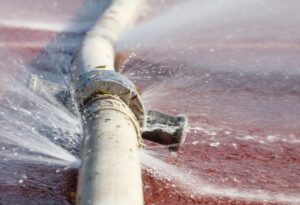
The Basics of Water Pressure
What Is Water Pressure?
Water pressure is the force exerted by the water in your plumbing system as it flows through pipes and fixtures. It’s typically measured in pounds per square inch (psi). Understanding this pressure is essential for maintaining a functioning and efficient plumbing system.
Factors Influencing Water Pressure:
Elevation: Homes at higher elevations experience lower water pressure because gravity has less force to drive the water downward.
Municipal Supply: The water pressure supplied by your local water utility can vary depending on factors like demand and infrastructure.
Pipe Diameter and Material: The size and material of your pipes can affect water pressure. Smaller or corroded pipes may restrict flow and reduce pressure.
Why Water Pressure Matters
Efficient Appliance Performance: Many appliances, like washing machines and dishwashers, rely on adequate water pressure to function optimally. Low water pressure can lead to longer cycle times and less effective cleaning.
Comfortable Showers: Adequate water pressure is essential for a satisfying shower experience. Low pressure can result in reduced water flow and lukewarm showers.
Preventing Pipe Damage: Excessively high water pressure can strain your plumbing system, leading to leaks, bursts, and other costly damage.
Adjusting Water Pressure
- Pressure Regulator Valve:
A pressure regulator valve (PRV) can be installed on your main water supply line to control water pressure. A professional plumber can adjust it to your desired psi level.
- Consult Your Local Utility:
Contact your local water utility if you’re experiencing consistently low water pressure. They can check for supply issues and make necessary adjustments.
- Pipe Upgrades:
In some cases, upgrading your plumbing pipes to larger diameters can improve water pressure, especially if your current pipes are old or corroded.
- Regular Maintenance:
Perform regular maintenance on your plumbing system to ensure no blockages or leaks could affect water pressure.
Water Pressure: The Key to a Well-Functioning Plumbing System
Understanding the science of water pressure is essential for maintaining a functional and efficient plumbing system in your Riverside or San Bernardino County home. Whether you need to adjust your water pressure to improve appliance performance, enjoy better showers, or prevent pipe damage, the proper knowledge and professional assistance from Top Tier Plumbing and Rooter can help you achieve the perfect balance for your needs. Call (951) 475-6521 today!

